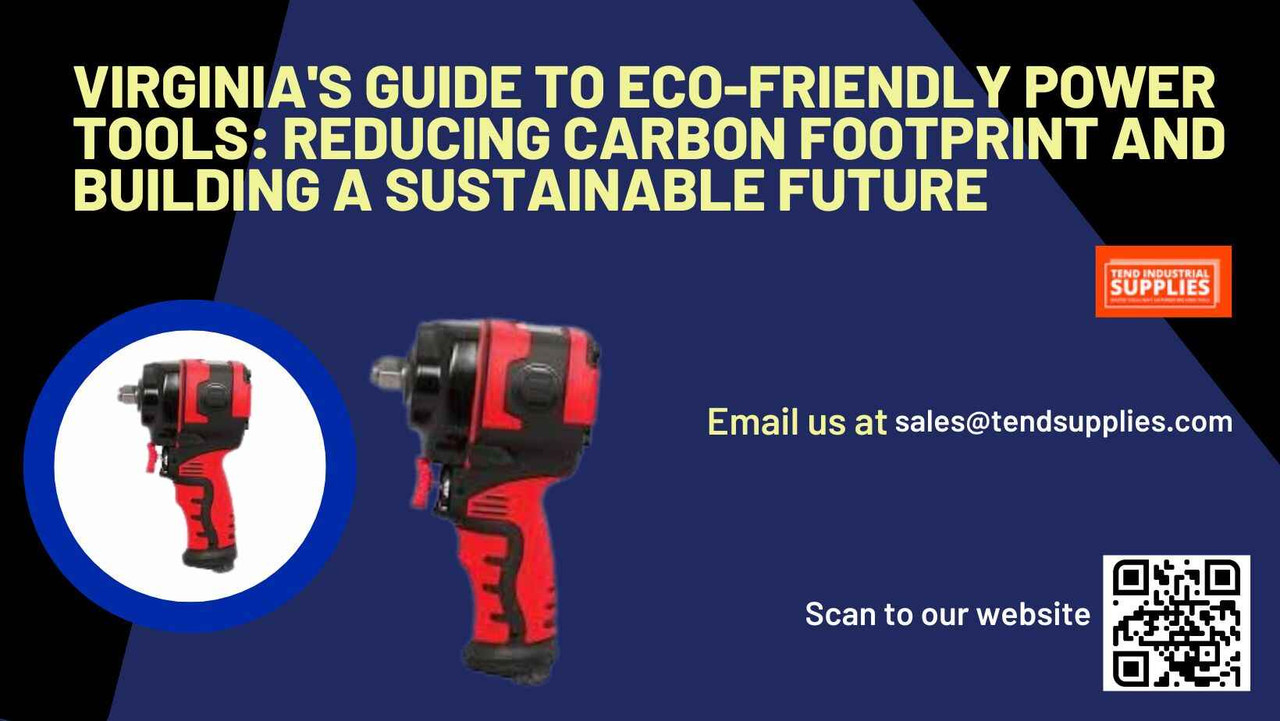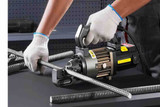Virginia's Guide to Eco-Friendly Power Tools: Reducing Carbon Footprint and Building a Sustainable Future
Key Takeaways
- Eco-friendly power tools significantly reduce Virginia's overall carbon emissions.
- Battery-powered tools offer increasingly efficient and powerful alternatives to gas-powered options.
- Proper maintenance, responsible disposal of tools and batteries, and energy-efficient practices are crucial for environmental protection.
Introduction
Virginia, a state renowned for its natural beauty and rich history, is taking progressive steps towards environmental conservation and sustainable practices. This commitment extends to the construction and DIY sectors, where a growing movement embraces eco-friendly alternatives to traditional power tools. This comprehensive guide explores how Virginians, from homeowners to businesses, can contribute to a greener future by choosing and using environmentally friendly power tools, aligning with the state's environmental goals.
Understanding the Environmental Impact of Power Tools
Traditional power tools, particularly gas-powered options, are significant contributors to carbon emissions and air pollution. In Virginia, where the effects of climate change are increasingly evident, from rising sea levels to extreme weather events, reducing these emissions is a top priority.
Beyond the Basics: Exploring Eco-Friendly Power Tool Options
This guide delves deeper than just highlighting the benefits of eco-friendly power tools. We explore the different types available and how they can be integrated into various projects:
1. Battery-Powered Tools:
Technology advancements have transformed battery-powered tools into viable contenders, offering:
* Cordless drills and impact drivers for versatile use.
* Battery-powered lawn mowers and trimmers for quieter, emission-free yard maintenance.
* Cordless sanders and saws, ideal for both indoor and outdoor projects.
These tools are particularly well-suited for Virginia's diverse landscapes, from urban backyards to sprawling rural properties.
2. Corded Electric Tools:
While less portable, corded electric tools offer consistent power without emissions:
* Circular saws and jigsaws for precise cutting tasks.
* Belt sanders and orbital sanders for efficient finishing work.
* Bench grinders and drill presses for stationary workshop applications.
3. Manual and Hybrid Tools:
For specific tasks, manual or hybrid tools can be effective and eco-friendly alternatives:
* Push reel mowers for small lawns, promoting exercise and reducing noise pollution.
* Hand saws and manual drills for light projects, offering a cost-effective and traditional approach.
* Hybrid tools that combine manual operation with minimal power assistance, ideal for tasks requiring finesse.
Benefits of Eco-Friendly Power Tools for Virginia
The advantages of adopting eco-friendly power tools extend beyond environmental benefits:
1. Reduced Carbon Emissions:
Switching to electric or battery-powered tools directly impacts Virginia's carbon footprint, contributing to a cleaner and healthier environment.
2. Improved Air Quality:
This shift is particularly beneficial in urban areas like Richmond and Northern Virginia, where air quality is a growing concern.
3. Noise Reduction:
Electric tools generally operate quieter, improving user experience and reducing noise pollution in neighborhoods and workplaces.
4. Energy Efficiency:
Many eco-friendly tools are more energy-efficient, aligning with Virginia's push for energy conservation and reduced reliance on fossil fuels.
5. Cost Savings:
While the initial cost of eco-friendly tools may be higher, long-term savings are significant due to reduced fuel consumption and lower maintenance needs.
Choosing the Right Eco-Friendly Power Tools for Virginia
Selecting the perfect eco-friendly tools requires careful consideration of various factors:
1. Power and Performance:
Ensure the tool meets your specific needs, whether for heavy-duty construction projects or DIY home improvement tasks.
2. Battery Life and Charging Time:
Consider the balance between battery life for uninterrupted work and charging time for efficient workflow.
3. Durability and Repairability:
Look for tools built to last with readily available replacement parts or repair options to minimize waste and extend their lifespan.
4. Energy Star Certification:
Opt for tools with Energy Star certification for guaranteed energy efficiency and responsible manufacturing practices.
5. Local Availability and Support: Choose tools with a strong presence in Virginia for easier access to replacement parts, repairs, and customer service.
Maximizing the Eco-Friendliness of Your Power Tools
Beyond choosing the right tools, responsible use and maintenance practices are crucial for maximizing their environmental benefits:
1. Proper Maintenance:
Regular maintenance extends tool life, optimizes performance, and reduces energy consumption. This includes cleaning tools after use, sharpening blades and bits, and storing them properly to prevent damage and corrosion.
2. Efficient Use:
Maximize the eco-friendliness of your tools by:
* Using the right tool for the job to avoid unnecessary power consumption.
* Optimizing your work process to reduce tool runtime and energy usage.
* Sharing or renting tools for occasional use to minimize individual ownership and consumption.
3. Responsible Charging:
For battery-powered tools:
* Charge during off-peak hours to reduce strain on Virginia's power grid.
* Consider solar charging options, especially in areas with ample sunlight.
* Avoid overcharging to extend battery life and ensure optimal performance.
4. Proper Disposal and Recycling:
When it's time to replace your eco-friendly tools or batteries, follow Virginia's guidelines for responsible disposal:
* Utilize local e-waste recycling programs.
* Participate in manufacturer take-back programs.
* Dispose of batteries at designated recycling centers across Virginia.
Virginia's Initiatives Supporting Eco-Friendly Tools
Virginia has implemented several initiatives to promote the adoption of eco-friendly power tools:
1. Tax Incentives:
Some localities offer tax breaks for businesses investing in energy-efficient equipment, including power tools.
2. Green Building Programs:
Virginia's green building initiatives often include points for using eco-friendly construction methods and tools.
3. Education and Outreach:
State-sponsored programs educate residents and businesses about the benefits of eco-friendly practices, including tool selection and usage.
4. Rebate Programs:
Some utility companies in Virginia offer rebates for purchasing energy-efficient appliances and tools.
The Future of Eco-Friendly Power Tools in Virginia
As Virginia continues to prioritize environmental sustainability, we can expect:
- Increased Availability: A wider range of eco-friendly power tools will become available to meet growing demand.
- Advancements in Battery Technology: Improvements in battery capacity, charging times, and durability will further enhance the appeal of battery-powered tools.
- Integration of Smart Features: Eco-friendly tools may incorporate smart features for optimized energy usage and performance.
- Growth in the Market for Refurbished and Remanufactured Tools: Supporting a circular economy and reducing waste.
Case Studies: Virginia Businesses Embracing Eco-Friendly Tools
To inspire action, here are case studies of Virginia businesses successfully integrating eco-friendly power tools:
- Richmond Construction Firm: A Richmond-based construction company switched to battery-powered tools for most of their operations, resulting in a 30% reduction in their carbon emissions and significant cost savings on fuel.
- Charlottesville Landscaping Service: A landscaping business in Charlottesville transitioned to all-electric lawn care equipment, reducing noise pollution and emissions while attracting environmentally conscious clients.
- Norfolk Woodworking Shop: A small woodworking shop in Norfolk implemented a tool-sharing program among local craftsmen, reducing individual tool ownership and promoting community engagement.
Frequently Asked Question
1. Are battery-powered tools powerful enough for professional use in Virginia's construction industry?
Many modern battery-powered tools are comparable in power to their gas-powered counterparts and are suitable for professional use. Advances in battery technology have made them viable options for most construction tasks in Virginia.
2. How can Virginia homeowners determine the most eco-friendly tool for their needs?
Consider factors like energy efficiency ratings, battery life, and the tool's overall lifecycle. Look for Energy Star certified products and research the manufacturer's sustainability practices. Local Virginia hardware stores often have knowledgeable staff who can provide guidance.
3. What are Virginia's regulations regarding the disposal of power tool batteries?
Rechargeable batteries are classified as universal waste in Virginia. They must be recycled at designated facilities. Many retailers in Virginia offer battery recycling programs. Check with your local waste management authority for specific guidelines.
4. Are there any Virginia-specific incentives for businesses switching to eco-friendly power tools?
While incentives can vary by locality, some Virginia regions offer tax breaks or rebates for businesses investing in energy-efficient equipment. Check with your local chamber of commerce or the Virginia Department of Environmental Quality for current programs.
5. How do eco-friendly power tools perform in Virginia's varied climate conditions?
Most modern eco-friendly tools are designed to perform well in a range of temperatures. However, extreme cold can affect battery life, so proper storage and care are important, especially during Virginia's winter months.
Conclusion
The shift towards eco-friendly power tools represents a significant opportunity for Virginia to reduce its carbon footprint and promote sustainable practices in construction, landscaping, and DIY projects. By choosing energy-efficient, battery-powered, or manual alternatives to traditional gas-powered tools, Virginians can contribute to cleaner air, reduced noise pollution, and overall environmental conservation.
As technology continues to advance and Virginia's policies increasingly support green initiatives, the adoption of eco-friendly power tools is not just an environmentally responsible choice, but also a economically sound one. The long-term benefits in terms of energy savings, reduced maintenance costs, and alignment with state environmental goals make the transition to eco-friendly tools a wise investment for both businesses and individuals across the Commonwealth.
Ready to make your toolkit more eco-friendly and contribute to Virginia's sustainable future? Visit tendsupplies.com or contact us at sales@tendsupplies.com to explore our range of energy-efficient and battery-powered tools. Let us help you power your projects with efficiency and precision!
Related Articles
- The Benefits of Brushless Motor Power Tools for Delaware's DIY Market
- Eco-friendly Lighting: The Impact of Rechargeable LED Lights
- Innovative Hand Tools: New Technologies Revolutionizing DIY and Professional Work
By incorporating these additional insights, the article provides a more comprehensive and valuable resource for Virginia residents seeking information on eco-friendly power tools and their benefits.









